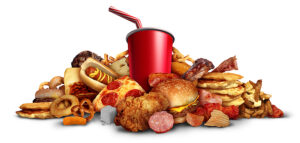A Lancet study published on Nov. 13, 2023 found that too much ultraprocessed food makes you sick. Researchers noted that ultraprocessed animal products and sweetened beverages were linked to an increased cancer risk as well as other diseases such as strokes or diabetes.
In Europe more than half of the food intake consists of ultraprocessed food. In the US a 2019 study found that 71% of the food supply is ultraprocessed.
Details of the study
The details of the study were summarized in a CNN report. Researchers of the study collected nutritional data from 266,666 men and women (60% were women) from 7 European countries between 1992 and 2000. The researchers followed the participants for 11 years. During that time they observed the participants for the development of chronic diseases and cancer. During the observation time 21,917 primary cancers, 10,939 cardiovascular events, and 11,322 type 2 diabetes cases developed. On entry into the study participants were questioned about their food intake in the past 12 months. This was matched with the NOVA classification system. It became clear that not all ultraprocessed foods were detrimental to the health of the participants. Animal products and sugar-sweetened drinks and foods caused chronic diseases in the participants of the study. However, ultra-processed breads, cereals or alternative plant-based products were neutral in terms of health risks.
Main findings of the study: too much ultraprocessed food makes you sick
The main findings of the study were that ingesting mostly ultraprocessed food leads to a 9% increase of heart attacks, strokes, diabetes and cancer. This is in comparison to controls who ate very little ultraprocessed food. However, when you reduce your intake of ultraprocessed food your risk of developing these diseases reduces. The key is to eat more fruit and vegetables and concentrate on eating minimally processed food.
Other studies with similar findings
In 2022 the British Medical Journal published two studies that documented a higher colorectal cancer rate and cardiovascular disease rate when subjects were eating larger amounts of ultraprocessed foods (UPF). Specifically, when men had exposure to a high percentage of UPF in their diet they developed 29% more colorectal cancer after 28 years of observation in comparison to men who ate a low percentage of UPF. A related study that went on for 14 years showed a 32% higher risk for death from cardiovascular disease for men who ate a high UPF diet in comparison to men on a low UPF diet.
French study 2019
A French study in 2019 followed 44, 551 French adults 45 years or older for 7.1 years. A 10% increase of consumption of ultraprocessed food caused a 14% higher risk of all-cause mortality. The authors stated that 80% of all premature deaths from noncommunicable disease are due to cardiovascular disease (CVD), respiratory disease, cancer, and diabetes. The authors discussed in detail the problems with overconsumption of ultraprocessed food.
Some of the contents of ultraprocessed food
Ultraprocessed food contains:
- High salt content, and high sodium intake has been associated with cardiovascular deaths and increased stomach cancer risk.
- Excessive amounts of added sugar. There is an association between added sugar consumption and an increased risk of mortality from cardiovascular disease.
- Ultraprocessed foods contain very little fiber. More dietary fiber in one’s diet has an association with lower death rates.
- Studies have estimated that reducing saturated and trans fats, salt, and added sugar in the diet prevent cardiovascular deaths.
- High temperature food processing produces acrylamide. Acrylamide is a known carcinogen.
- Consumption of processed meat products causes a higher risk of colorectal cancer and stomach cancer.
More ingredients of ultraprocessed food
- Artificial sweeteners can alter microbiota and can cause the onset of type 2 diabetes and metabolic diseases.
- With bisphenol A coating in food packaging endocrine disruptors enter the food. Bisphenol A causes endocrine cancers and metabolic diseases, such as diabetes and obesity.
- The food industry uses additives frequently in their formulations. Some studies raised concerns about the health consequences of food additives. For instance, the food industry uses titanium dioxide widely. There is an association of titanium dioxide and increased risk of chronic intestinal inflammation and carcinogenesis.
It is easy to see that when we expose our bodies to a mix of these ingredients this can cause cardiovascular diseases, cancers and diabetes. The final outcome is that this leads to premature deaths.
Conclusion
Too much ultraprocessed food (UPF) makes you sick. This is the conclusion of a large study, which the Lancet published on Nov. 13, 2023. Researchers followed 266,666 men and women (60% women) for 11 years. The main findings of the study were that ingesting mostly ultraprocessed food leads to a 9% increase of heart attacks, strokes, diabetes and cancer. This is in comparison to controls who ate very little ultraprocessed food. Other studies going back to 2019 and 2022 showed very similar findings.
Other studies
A French study from 2019 noted that a 10% increase of consumption of ultraprocessed food caused a 14% higher risk of all-cause mortality. Several studies in 2022 showed that men who had an exposure to a high percentage of UPF in their diet developed 29% more colorectal cancer after 28 years of observation in comparison to men who ate a low percentage of UPF. A related study that went on for 14 years showed a 32% higher risk for death from cardiovascular disease for men who ate a high UPF diet in comparison to men on a low UPF diet. It follows from this data that a simple diet consisting of vegetables, fruit, nuts and lean meat (chicken turkey, fish) with minimal amounts of UPF protects you from premature death.






